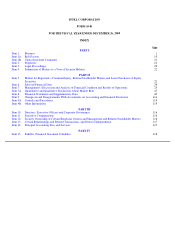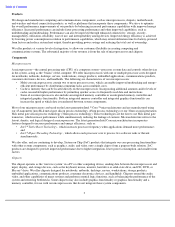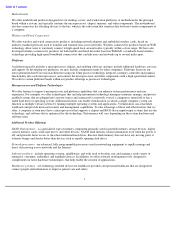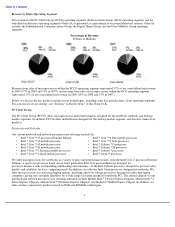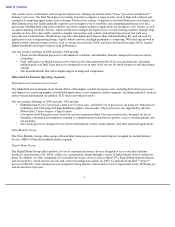Intel 2009 Annual Report Download - page 14
Download and view the complete annual report
Please find page 14 of the 2009 Intel annual report below. You can navigate through the pages in the report by either clicking on the pages listed below, or by using the keyword search tool below to find specific information within the annual report.
Table of Contents
Employees
As of December 26, 2009, we had 79,800 employees worldwide, with 55% of those employees located in the U.S.
Sales and Marketing
Customers
We sell our products primarily to original equipment manufacturers (OEMs) and original design manufacturers (ODMs).
ODMs provide design and/or manufacturing services to branded and unbranded private-label resellers. In addition, we sell our
products to other manufacturers, including makers of a wide range of industrial and communications equipment. Our
customers also include PC and network communications products users who buy PC components and our other products
through distributor, reseller, retail, and OEM channels throughout the world. In certain instances, we have entered into supply
agreements to continue to manufacture and sell products of divested business lines to acquiring companies during certain
transition periods.
Our worldwide reseller sales channel consists of thousands of indirect customers, systems builders that purchase Intel
microprocessors and other products from our distributors. We have a boxed processor program that allows distributors to sell
Intel microprocessors in small quantities to these systems-builder customers; boxed processors are also available in direct
retail outlets.
In 2009, Hewlett-Packard Company accounted for 21% of our net revenue (20% in 2008 and 17% in 2007) and Dell Inc.
accounted for 17% of our net revenue (18% in 2008 and 2007). No other customer accounted for more than 10% of our net
revenue. For information about revenue and operating income by operating segment, and revenue from unaffiliated customers
by geographic region/country, see “Results of Operations” in Part II, Item 7 and “
Note 29: Operating Segment and Geographic
Information” in Part II, Item 8 of this Form 10-K.
Sales Arrangements
Our products are sold or licensed through sales offices throughout the world. Sales of our products are typically made via
purchase orders that contain standard terms and conditions covering matters such as pricing, payment terms, and warranties, as
well as indemnities for issues specific to our products, such as patent and copyright indemnities. From time to time, we may
enter into additional agreements with customers covering, for example, changes from our standard terms and conditions, new
product development and marketing, private-label branding, and other matters. Most of our sales are made using electronic
and web-based processes that allow the customer to review inventory availability and track the progress of specific goods
ordered. Pricing on particular products may vary based on volumes ordered and other factors. We also offer discounts, rebates,
and other incentives to customers to increase acceptance of our products and technology.
Our products are typically shipped under terms that transfer title to the customer, even in arrangements for which the
recognition of revenue and related costs of sales is deferred. Our standard terms and conditions of sale typically provide that
payment is due at a later date, generally 30 days after shipment or delivery. Our credit department sets accounts receivable and
shipping limits for individual customers to control credit risk to Intel arising from outstanding account balances. We assess
credit risk through quantitative and qualitative analysis, and from this analysis, we establish credit limits and determine
whether we will seek to use one or more credit support devices, such as obtaining some form of third-party guaranty or
standby letter of credit, or obtaining credit insurance for all or a portion of the account balance if necessary. Credit losses may
still be incurred due to bankruptcy, fraud, or other failure of the customer to pay. For information about our allowance for
doubtful receivables, see “Schedule II—Valuation and Qualifying Accounts” in Part IV of this Form 10-K.
Most of our sales to distributors are made under agreements allowing for price protection on unsold merchandise and a right of
return on stipulated quantities of unsold merchandise. Under the price protection program, we give distributors credits for the
difference between the original price paid and the current price that we offer. On most products, there is no contractual limit
on the amount of price protection, nor is there a limit on the time horizon under which price protection is granted. The right of
return granted generally consists of a stock rotation program in which distributors are able to exchange certain products based
on the number of qualified purchases made by the distributor. Although we have the option to grant credit for, repair, or
replace defective products, there is no contractual limit on the amount of credit granted to a distributor.
9



